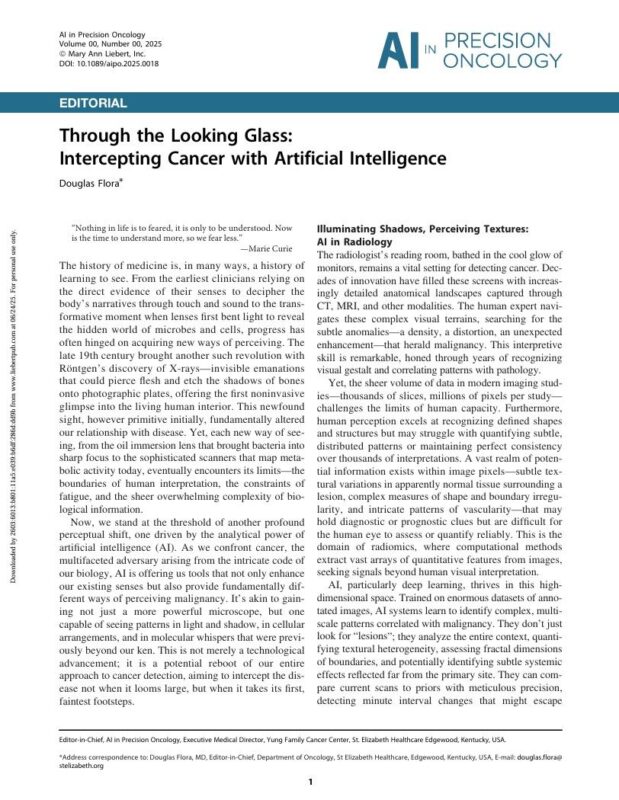Douglas Flora, President-Elect Association of Cancer Care Centers at Association of Cancer Care Centers, shared on LinkedIn:
” ‘Nothing in life is to feared, it is only to be understood. Now is the time to understand more, so we fear less.’
—Marie Curie
The August issue of AI in Precision Oncology is out, including my editorial on how I believe we will start to intercept cancer earlier by changing how we see it. My hope is to continue to spark discussions about detecting cancers at the story’s beginning, not its middle chapters. What if we can detect cancer not when it has massed into a tumor, but in its earliest stirrings–when a handful of cells first lose their restraint, the immune system fails to recognize a threat, and the metabolic signature first shifts?
The history of medicine is, in many ways, a history of learning to see. From the earliest clinicians relying on the direct evidence of their senses to decipher the body’s narratives through touch and sound to the transformative moment when lenses first bent light to reveal the hidden world of microbes and cells, progress has often hinged on acquiring new ways of perceiving.
The late 19th century brought another such revolution with Röntgen’s discovery of X-rays—invisible emanations that could pierce flesh and etch the shadows of bones onto photographic plates, offering the first noninvasive glimpse into the living human interior. This newfound sight, however primitive initially, fundamentally altered our relationship with disease. Yet, each new way of seeing, from the oil immersion lens that brought bacteria into sharp focus to the sophisticated scanners that map metabolic activity today, eventually encounters its limits—the boundaries of human interpretation, the constraints of fatigue, and the sheer overwhelming complexity of biological information.
Now, we stand at the threshold of another profound perceptual shift, one driven by the analytical power of artificial intelligence (AI). As we confront cancer, the multifaceted adversary arising from the intricate code of our biology, AI is offering us tools that not only enhance our existing senses but also provide fundamentally different ways of perceiving malignancy.
It’s akin to gaining not just a more powerful microscope, but one capable of seeing patterns in light and shadow, in cellular arrangements, and in molecular whispers that were previously beyond our ken. This is not merely a technological advancement; it is a potential reboot of our entire approach to cancer detection, aiming to intercept the disease not when it looms large, but when it takes its first, faintest footsteps.
Read on, and tell me what you think? I think this these technologies are getting better, fast, and in 5-10 years may supplant our current screening approaches, enabling us to INTERCEPT these cancers when we can still cure them.”

More posts featuring Douglas Flora.


